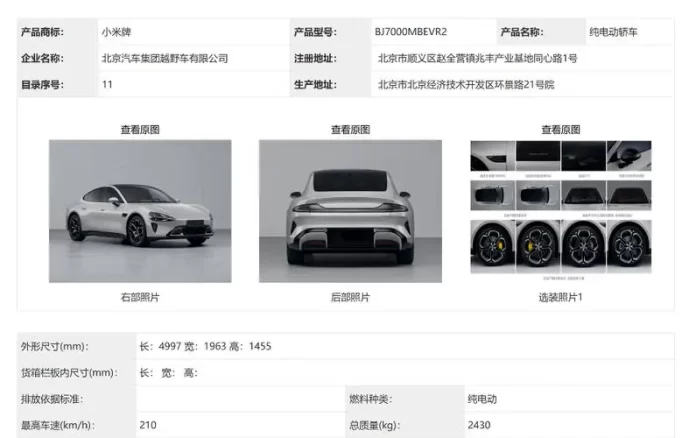Xiaomi’s acquisition of the “provisional production license” has attracted widespread attention.
On November 15, the Ministry of Industry and Information Technology issued the “Announcement of Road Motor Vehicle Production Enterprises and Products” (Batch 377), officially unveiling two Xiaomi-branded cars. The company is named Beijing Automotive Group Off-Road Vehicle Co., Ltd., with its production address at No. 21, Huanjing Road, Beijing Economic and Technological Development Zone.
BAIC Off-Road Vehicle Co., Ltd. is a wholly-owned subsidiary of Beijing Automotive Group Co., Ltd., with the actual controlling shareholder being the State-owned Assets Supervision and Administration Commission of the Municipal Government of Beijing. The inclusion in the Ministry of Industry and Information Technology’s declaration catalog indicates that Xiaomi Cars has obtained the “provisional production license.”
According to the announcement, the Xiaomi-branded pure electric sedan models are BJ7000MBEVR2 and BJ7000MBEVA1. Based on the announcement, it appears that these electric cars should be produced by BAIC, given the company name. However, according to information obtained by the reporter from The Paper, Xiaomi Cars will be produced in Xiaomi’s factory in the Beijing Economic and Technological Development Zone. According to the Ministry of Industry and Information Technology, the production address for Xiaomi Cars is “No. 21, Huanjing Road, Beijing Economic and Technological Development Zone,” which is the location of Xiaomi Cars’ self-built factory.
According to publicly available information, Xiaomi’s car factory is constructed in two phases, with the first phase covering an area of approximately 720,000 square meters and an annual production capacity of 150,000 vehicles, scheduled for completion in June 2023. The second phase is planned to commence in 2024 and be completed in 2025. The relevant workshops for the first phase of Xiaomi’s car factory passed inspection on June 12.
The question arises as to whether Xiaomi has its own automobile production qualification or if it is “borrowing” BAIC’s production qualification. Xiaomi has not disclosed specific information on this matter to The Paper.
Zhang Xiang, the director of the New Energy Automobile Technology Research Institute at Jiangxi New Energy Technology Vocational College, told The Paper that companies like NIO, Xiaopeng, and GAC Group have previously used other carmakers’ production lines, and Xiaomi’s model is likely compliant. Xiaomi should be able to obtain production qualifications, but it requires a certain process and time. “Launching a car requires seizing the market opportunity, so it might be borrowing BAIC’s qualification to expedite production,” Zhang said.
According to images, Xiaomi’s first car is an all-electric sedan, with models SU7 and SU7 Max, a length of 4.997 meters, and battery options including ternary lithium-ion batteries (CATL) and lithium iron phosphate batteries (Xiangyang FD Battery), which belongs to BYD.
In terms of specifications, the Xiaomi Cars SU7 has exterior dimensions of 4997mm × 1963mm × 1455mm, and the SU7 Max has exterior dimensions of 4997mm × 1963mm × 1440mm, with both having a wheelbase of 3 meters.
Regarding power, the SU7 is equipped with the lithium iron phosphate battery from Xiangyang FD Battery Co., Ltd., with a motor power of 220KW and a maximum speed of 210 km/h. The SU7 Max is equipped with the ternary lithium-ion battery from CATL, with a maximum speed of 265 km/h and power ranging from 220KW to 275KW, suggesting a dual-motor configuration.
In terms of appearance, based on the released images, Xiaomi Cars’ design is similar to previously leaked spy photos, featuring a sleek design. The car’s logo retains the original Xiaomi “MI” design, without a complete redesign.
In terms of optional accessories, the announcement indicates that customers can choose side fender lettering, rear window glass lettering, ETC, different exterior mirrors, various panoramic sunroofs, different styles of front windshield glass, laser radar, different exterior wheel hubs, and colored calipers.
Xiaomi has long been preparing for its entry into the automotive industry.
As early as 2021, Lei Jun announced the “All in” car-making plan. On March 30, 2021, Xiaomi officially announced the establishment of a wholly-owned subsidiary dedicated to the intelligent electric vehicle business, with an initial investment of 10 billion RMB and an expected total investment of 10 billion USD over the next 10 years. Lei Jun will also serve as the CEO of the intelligent electric vehicle business.
On August 11 of the same year, it was exclusively reported by The Paper that Xiaomi had invested 3.3 billion RMB in the first phase of autonomous driving research and development, forming a research and development team with over 500 members. At the same time, Xiaomi’s autonomous driving technology had entered the testing phase, planning to deploy 140 test vehicles nationwide, with the goal of entering the industry’s leading ranks by 2024.
During this year’s National People’s Congress, Lei Jun, in a written interview with The Paper, stated that Xiaomi’s progress in the intelligent electric vehicle business has consistently exceeded expectations. The first car is expected to be produced in 2024 and achieve mass production. He also mentioned at the Beijing delegation meeting that Xiaomi Cars had successfully completed winter testing.
Subsequently, in a telephone conference in May, Xiaomi President Lu Weibing revealed in an interview with The Paper that Xiaomi’s car-making progress was on schedule or slightly ahead of schedule. Xiaomi Cars would undergo winter and summer testing as planned this year. “Last winter, our soft film cars participated in winter testing in Heihe, and the progress was very good.”
In July of this year, Xiaomi Cars’ supplier, FAW Jilin Richen Automotive Parts Co., Ltd. (FAW Richen, 600742.SH), revealed that the company is actively communicating with Xiaomi Cars, and several subsidiaries have entered Xiaomi Cars’ procurement team. Currently, the first Xiaomi car model has completed its quotation.
Previously, Lei Jun revealed in an internal speech that Xiaomi’s future goal for car-making is to enter the world’s top five within 15-20 years. At that time, he disclosed that half of his daily time was devoted to car-making, while a quarter was allocated to the smartphone, IoT, and high-end strategy.
